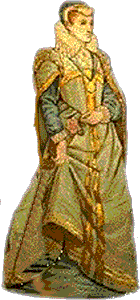







Copyright (c) 1998
Royal Stuarts
All Rights Reserved
Royal Stuarts
All Rights Reserved
|
Mary's return to Scotland - 1561
from
|
 |
Mary as painted on the mural of the Museum of Antiquities |
Queen Mary embarked to return to Scotland on the 14th of August 1561. She and her escort sailed from Calais in two of the galleys then almost peculiar to France, as vessels which went before the wind when they could, and were rowed by galley-slaves on benches at other times. Two ordinary sailing vessels attended, the whole making a fleet of four. She was well escorted. There were with her, besides many minor nobles of France, her two uncles, the Duke of Aumale and the Marquis of Elboeuf; her two adorers, Marshal d'Amville, and Chastellar, whose adoration afterwards cost him so dear. There was Strozzi-apparently the son of the general who besieged St Andrews-and La Noue, afterwards known in the Huguenot wars as Bras de Fer. By far the most interesting, however, of her attendants to us at the present day was Brantome, who sailed in the same galley with her. Her conduct during the voyage has been treasured and told in various shapes; but as the original source of all of them is a few precious sentences by that vivid writer in his little book 'Des Dames Illustres,' it may be well to adhere to what is so said. A light wind sprang up, the crew of galley slaves were released from their labours, and the sails set. As the lumbering vessels moved slowly away, the queen sat beside the helm, as the place where she would be nearest the land she was leaving. She gazed on it with her fine eyes, and wept bitterly throughout the remaining five hours of daylight, repeating over and over the simple words," Adieu, France" When the sight of land faded into the darkness, she uttered passionate words about the jealous night drawing its curtain before her, and with tears falling faster and faster, exclaimed that the sight of France was now lost to her-she would never see it more. She then became conversible, and spoke of herself with her eyes bent on the land, dropping a sentiment about her reversing the attitude of Dido, who, when AEneas departed, ever gazed on the sea. She slept on the deck. desiring the pilot to waken her immediately, should the land become again visible at dawn. The wind fell, and the slaves were set to their slow labors again, so that next morning the coast was still to be seen; and sitting up, she looked on it till it vanished, crying-" Adieu la France, cela est fait. Adieu la France, je pense ne vous voir jamais plus!" The queen reached her dominion through the port of Leith on the morning of the 19th of August. The voyage was made with unusual rapidity in four days, as it appears. The event was not expected. The arrival of their queen was announced to the nearest inhabitants by the discharge of the guns mounted on the galleys. What ever arrangements were in preparation for the event had not been completed, find the contrast between Scotland and France was Weather exaggerated than modified. She and her following had to wait some time at Leith ere horses-there were no carnages-could be procured for them. Brantome, whose narrative still accompanies us, says the queen burst into tears at the sorry contrast with the gorgeous processions of France. He says nothing more, however against the equipage, save that it consisted of the horses of the country, with conformable harness; but this he seems to have thought enough.
Some zealous citizens sought to enliven her first night at Holyrood by a serenade, in which it is said that fiddles with three strings bore a conspicuous and discordant part. Whatever effect the discord may have had on the queen herself, it seems to have grated direfully on the nerves of Brantome, who describes the attempt as some five or six hundred "marauds " performing on mechans violoyis and petits rebecs; continuing, by way of a aggravation apparently, that the music, abominably performed by them, partook of the nature of psalmody. The serenade is described by an observer of a different order in Knox's History, where we are told that "a company of most honest men, with instruments of music and with musicians, gave their salutations at her chamber window," and that the queen said the melody "liked her well," and she wished the same to be continued some nights after.
The spoilt beauty expected to find in the land of her destiny a dreary contrast with that of her adoption, and she found her expectations fully realized. France, though now more closely and economically cultivated, scarcely bears to outward appearance a richer raiment of civilized fruitfulness than it did then. Wherever royalty was likely to resort, there were palaces and chateaus, walled towns, fine churches, and great stretches of pleasure-ground. Scotland was yet ignorant of the high cultivation which has warmed her cold landscape and softened her dreary winds. There was a greater contrast even in the people than in the country. England was behind France in a certain kind of civilization; the Court and the aristocracy were more home-spun and yeoman-like. Scotland was a much greater distance behind England, and lacked the solid respectability which was then ripening into a civilization more firm and true than that of France. The common people of Scotland were perhaps as well off as those of France, but they were not subdued to the same submissive order, being self-willed, boisterous, and, down to the very humblest grade, even proud.



